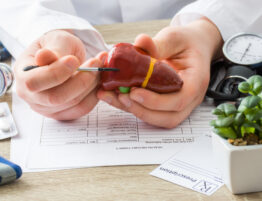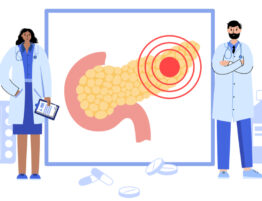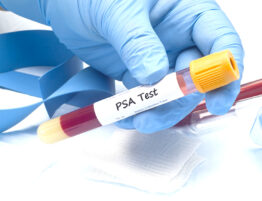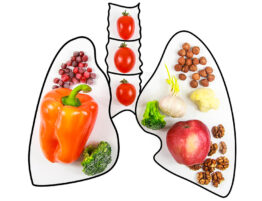
Colon cancer is a type of cancer that originates in the large intestine. Colon cancer is also occasionally identified as colorectal cancer or rectal cancer depending on its origin. The large intestine is the final part of the digestive system, also known as gastrointestinal (GI) system, and it consists of colon and rectum. Colon is the largest portion of the large intestine, comprising four sections: ascending colon, transverse colon, descending colon and sigmoid colon. The sigmoid colon connects to the rectum. Colon is mainly responsible for absorbing remaining fluids and electrolytes before removing the waste products as stool.
Colon cancer usually begins as polyps, benign clumps of cells that form in the inner lining of the colon. Over time, cancer can form in a polyp and grows into the wall of the colon.
Colon cancer is the third most common cancer in the United States and is the third leading cause of cancer-related deaths in men and in women, and the second most common cause of cancer deaths.
The American Cancer Society estimates for colon cancer incidence in the United States for 2021 are:
Types of colon cancer:
There are there several types of colon cancer, depending where it originates from.
- Adenocarcinomas: the most common type of colon cancer. It originates in the cells in the inner lining of the colon.
- Carcinoid tumors: originates in the hormone-making cells in the intestine.
- Gastrointestinal stromal tumors (GISTs): originates from cells called interstitial cells of Cajal in the wall of the colon. Some of these cells are benign.
- Primary colon lymphomas: originates in cells called lymphocytes and may also develop in the colon or rectum.
- Sarcomas: originates in blood vessels, muscle layers, or other connective tissues in the wall of the large intestine.
What are the risk factors of colon cancer?
- Age: the risk of developing colon cancer increases with age. Most commonly develops after the age of 50.
- Race/ethnicity: African-Americans have higher risk of developing colon cancer.
- Past medical history: people with history of past colon cancer or polyps or inflammatory bowel disease have a higher risk of developing colon cancer.
- Inherited syndromes: about 5% of colon cancer is associated with inherited genetic mutations. The most common are Lynch syndrome (hereditary non-polyposis colorectal cancer, or HNPCC) and familial adenomatous polyposis (FAP).
- Family history of colon cancer
- Diet: diet low in fiber, high in fat and red meat is associated with increased risk of developing colon cancer
- Smoking: risk of developing colon cancer is higher smokers than non-smokers
- Obesity: risk of developing colon cancer is higher for people who are overweight or obese
- Diabetes: risk of developing colon cancer is higher for people with diabetes
- Lack of physical activity: people with sedentary lifestyle are more likely to develop colon cancer
- Previous cancer treatment: radiotherapy for treatment of previous cancer may increase the risk of developing colon cancer
Signs and symptoms of colon cancer:
- Change in bowel habits, such as persistent diarrhea, constipation or change in stool consistency
- Rectal bleeding
- Blood in your stool (dark brown or black in color)
- Persistent abdominal pain or discomfort
- Unrelieved feeling after emptying the bowel
- Weakness and fatigue
- Weight loss
How to diagnose colon cancer?
- Medical history and physical examination, including pelvic examination, followed by further tests and investigations, such as:
- Stool test – a fecal occult blood test (FOBT) or fecal immunochemical test (FIT)
- Colonoscopy with biopsy
- Blood tests
- Imaging tests (CT scan, MRI scan, PET/CT scan) can also be used to find out if the cancer has metastasized (spread) to other areas of the body
Treatment of colon cancer:
After diagnosis, your doctor will establish the stage of your disease. According to your current health status, history, and staging results, your doctor will discuss with you your treatment options. Regular follow-ups with your doctor and periodical monitoring with tests and investigations are highly recommended.
Treatment options include:
- Surgery: Surgery is often performed to treat early-stage colon cancer. The type of surgery depends on the stage of the cancer and its location.
- Polypectomy: performed by removing the polyp along with the cancer during a colonoscopy for early-stage colon cancer
- Local excision: performed by removing small cancers in the inner lining and small amount of surrounding healthy tissue in the colon during a colonoscopy for early-stage colon cancer
- Hemicolectomy, partial colectomy or segmental resection: performed by removing part of the colon and nearby lymph nodes then reattaching the remaining sections
- Total colectomy: performed by removing all of the colon
- Chemotherapy: using chemo drugs to kill cancer cells systemically, which can be taken either intravenously or orally. Chemotherapy may be given after surgery or before surgery.
- Adjuvant chemotherapy: is given after surgery to kill the possible remaining cancer cells to lower the chance of cancer recurrence
- Neoadjuvant chemotherapy: is given before surgery and sometimes with radiation to try to reduce the size of the tumour before removal
- Radiotherapy: using high-powered energy beams to kill cancer cells. Radiotherapy can be used before surgery, after surgery or during surgery. The two types of radiotherapy used for treating colon cancer are external beam radiation therapy (EBRT) and brachytherapy.
- Targeted therapy: using certain drugs to target specific abnormalities present within cancer cells.
- Immunotherapy: using immune cells or certain drugs which alert the immune cells to kill cancer cells.
- Alternative treatments: using other scientific based alternatives to attack cancer cells.
How to prevent colon cancer?
You can reduce your risk of colon cancer by doing the following:
- Opt for a healthy diet
- Limit alcohol consumption
- Stop smoking
- Regular exercise
- Maintain a healthy weight
References:









